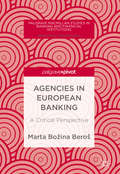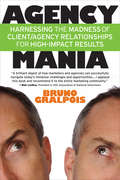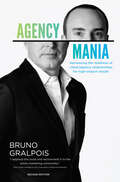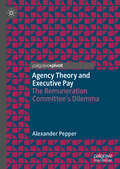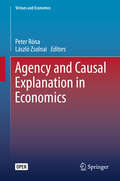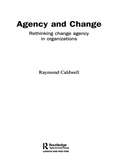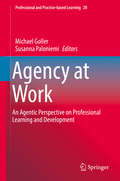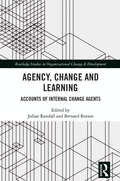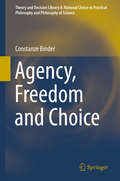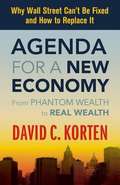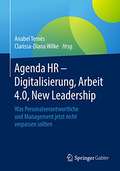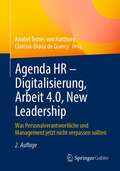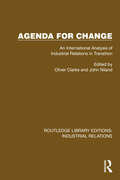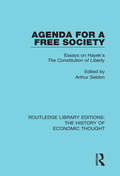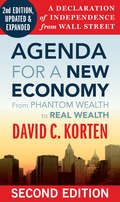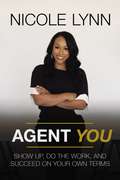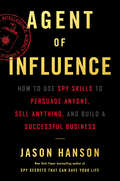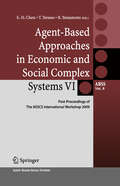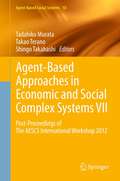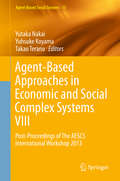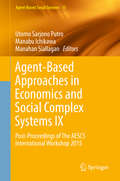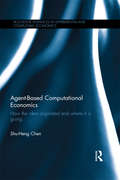- Table View
- List View
Agencies in European Banking: A Critical Perspective (Palgrave Macmillan Studies in Banking and Financial Institutions)
by Marta Božina BerošThis book studies relationship dynamics between National Competent Authorities (NCAs) within two agencies governing the European banking sector: the European Banking Authority and the Single Resolution Board. The analysis centres on NCAs policy preferences and the variety thereof, particularly in the context of banking market fragmentation (Euro area vs. non-Euro area countries/banking union "ins" and "outs"). The focus is not so much on the motivations of these preferences, but on the processes and mechanisms that help reach NCAs consensus on prudential matters. Through an interdisciplinary approach rooted in legal analysis and political economy, the book shows how national actors inform decision-making within European agencies in banking, and whether—and how—the reality of differentiated integration within the internal banking market challenges policy creation.
Agency Mania: Harness The Madness of Client/Agency Relationships for High-Impact Results
by Bruno Gralpois Bob LiodiceAgency Mania was written because billions of dollars in company budgets are invested every year into marketing efforts that strive to deliver engaging consumer experiences and deliver measurable business results. To get most out of their marketing investment, brand advertisers of all sizes must demand more from their advertising and marketing communications agencies, and get the best possible work from these relationships while simultaneously driving the dual agenda of effectiveness and efficiency. Why do some client/agency partnerships thrive while others fail? And how can both parties improve the chances of success? Agency Mania is an indispensable guide in which, Bruno Gralpois reveals the anatomy of a strong partnership with an advertising, media, digital, PR or marketing communications agency that drives results and delivers real value to the client's business. Mr. Gralpois shines a bright light on the insanity of clients and agencies failing to effectively nurture their relations.
Agency Mania: Harnessing The Madness Of Client/agency Relationships For High-impact Results
by Bruno GralpoisWhy do some client/agency relationships thrive while others fail? At a time of unprecedented change and complexity in marketing and advertising, Agency Mania will transform the way you look at client/agency relationships and invite you to build sustained partnerships that deliver unmatched work and results. The world of marketing is a trillion-dollar industry and is changing at a drastic pace. The advertiser/agency relationship is under incredible pressure. Some may argue it’s even broken. The future of the advertising industry is uncertain. The entire marketing ecosystem is being tested. What will the agency of tomorrow look like? What competencies will agencies need to build? How will they deliver greater value to their clients? Similarly, how will advertisers reap the benefits agencies bring to their table? How will they become better clients? How will they set their partnerships up for success? In Agency Mania, partnership guru Bruno Gralpois demonstrates that these partnerships, once managed professionally, have remarkable transformational value and measurable business impact. The author shines a bright light on the insanity of advertisers and agencies failing to work optimally together or hold each other truly accountable. Building a successful long-term advertiser/agency partnership requires a robust set of competencies and operating principles.Agency Mania shows you step-by-step how it is done.
Agency Theory and Executive Pay: The Remuneration Committee's Dilemma
by Alexander PepperThis new book examines the relationship between agency theory and executive pay. It argues that while Jensen and Meckling (1976) were right in their analysis of the agency problem in public corporations they were wrong about the proposed solutions. Drawing on ideas from economics, psychology, sociology and the philosophy of science, the author explains how standard agency theory has contributed to the problem of executive pay rather than solved it. The book explores why companies should be regarded as real entities not legal fictions, how executive pay in public corporations can be conceptualised as a collective action problem and how behavioral science can help in the design of optimal incentive arrangements. An insightful and revolutionary read for those researching corporate governance, HRM and organisation theory, this useful book offers potential solutions to some of the problems with executive pay and the standard model of agency.
Agency and Causal Explanation in Economics (Virtues and Economics #5)
by László Zsolnai Peter RónaThis open access book provides an exploration of the consequences of the ontological differences between natural and social objects (sometimes described as objects of nature and objects of thought) in the workings of causal and agency relationships. One of its important and possibly original conclusions is that causal and agency relationships do not encompass all of the dependent relationships encountered in social life. The idea that social reality is contingent has been known (and largely undisputed) at least since Wittgenstein’s “On Certainty”, but social science, and most notably economics has continued to operate on the basis of causal and agency theories borrowed or adapted from the natural sciences. This volume contains essays that retain and justify the partial or qualified use of this approach and essays that totally reject any use of causal and agency theory built on determined facts (closed systems).The rejection is based on the possibly original claim that, whereas causation in the objects of the natural sciences reside in their properties, human action is a matter of intentionality. It engages with critical realist theory and re-examines the role of free will in theories of human action in general and economic theory in particular.
Agency and Change: Rethinking Change Agency in Organizations (Routledge Studies in Organizational Change & Development)
by Raymond CaldwellThis excellent book remaps the limits and possibilities of change, clearly shifting the focus from outmoded debates on agency and structure to new practice-based discourses on agency and change. Offering readers a selective and critical review of key literature and empirical research, it will help students contextualize this complex subject area and independently evaluate future prospects for effective change agent roles in organizations Presenting an interdisciplinary exploration of competing discourses, the book uses two overarching conceptual continua: centred agency-decentred agency and systems-processes, thereby allowing a more intensive focus on agency and change. Well-written with challenging content, this book is essential reading for those interested in the origins, development and future prospects for change agency in an organizational world characterized by increasing complexity, risk and uncertainty.
Agency and Democracy in Development Ethics
by Lori Keleher Stacy J. KoskoA diverse set of expert voices from the Global North and South - philosophers, economists, policy and development scholars and practitioners - explore two themes central to development ethics: agency and democracy. Established luminaries in development ethics engage with the book's themes alongside fresh voices on the way to becoming familiar figures in the field. Their essays work within diverse areas of development studies, including human security and human rights, democratic governance in theory and practice, the capability approach, gender and development, and applied and theoretical critiques of the philosophical underpinnings of various accounts of development. The result is a varied and comprehensive discussion of current work in development ethics that significantly advances our understanding of theoretical and practical work of development. This book will interest students, scholars, and practitioners of global justice, human rights, international development and political philosophy.
Agency at Work: An Agentic Perspective on Professional Learning and Development (Professional and Practice-based Learning #20)
by Michael Goller Susanna PaloniemiMichael Goller gives a structured overview of the current discourses of human agency in relation to professional learning and development. Based on this discussion, the author develops a theoretical framework including human agency as an individual feature (i. e. , a disposition) as well as a set of self-initiated and goal-directed behaviours that are assumed to affect employees' learning and development (e. g. , crafting of new work experiences). He then further specifies this theoretical framework and investigates it empirically in the domain of geriatric care nursing. Based on the findings of the three empirical studies conducted, the author discusses the relevance of human agency for the development of professional expertise of geriatric care nurses.
Agency, Change and Learning: Accounts of Internal Change Agents (Routledge Studies in Organizational Change & Development)
by Bernard Burnes Julian RandallDespite the plethora of books on change, there appears a notable gap in the field; rarely is the authentic and candid voice of change agents heard. How often do academics or practitioners candidly state what they actually do when they are faced with managing change in their own organisations or when they are called on in a consultancy capacity? In this new book, the editors bring together a diverse group of contributors who have worked as Internal Change Agents in organizations to divulge what they really do and think about change. The authors draw on their own research work involving change agents and their change interventions and include current reflections on the post-Covid world of work, and the change required for achieving change interventions successfully. Each contribution offers perspectives from real change programmes, in both the public and private sector, offering a unique opportunity to move beyond theory and understand change in practice. The book offers valuable insights for academics and students of organisational change and behaviour, leadership and organisational development.
Agency, Freedom and Choice (Theory and Decision Library A: #53)
by Constanze BinderIn this book, Binder shows that at the heart of the most prominent arguments in favour of value-neutral approaches to overall freedom lies the value freedom has for human agency and development. Far from leading to the adoption of a value-neutral approach, however, ascribing importance to freedom’s agency value requires one to adopt a refined value-based approach. Binder employs an axiomatic framework in order to develop such an approach. She shows that a focus on freedom’s agency value has far reaching consequences for existing results in the freedom ranking literature: it requires one to move beyond a person’s given all-things-considered preferences to the values underlying a person’s preference formation. Furthermore, it requires, as Binder argues, one to account (only) for those differences between choice options which really matter to people. Binder illustrates the implications of her analysis for the evaluation of public policy and human development with the capability approach: only if sufficient importance is ascribed to freedom’s agency value can the capability approach keep its promises.
Agency, Partnership, and the LLC: Cases, Materials, Problems (Eighth Abridged Edition)
by J. Dennis Hynes Mark J. LoewensteinThis is a condensed version of the hardbound casebook, designed for use by teachers who have limited time but still want a fairly full exposure to the law. The scope of coverage still includes all unincorporated forms of doing business. While new cases have been added and all materials have been updated, the main changes in this edition deal with partnerships and limited liability companies. Special attention is given to the effect of new or recently amended statutes
Agenda For a New Economy: Why Wall Street Can't Be Fixed and How to Replace It
by David C. KortenDavid Korten shows, the steps being taken to address it-including pouring trillions of dollars into bailouts for the Wall Street institutions that created the mess-do nothing to deal with the reality of a failed economic system.
Agenda HR – Digitalisierung, Arbeit 4.0, New Leadership: Was Personalverantwortliche und Management jetzt nicht Verpassen Sollten
by Anabel Ternès Clarissa-Diana WilkeInformieren Sie sich über die wichtigsten Trends im HR.<P><P> Zeitgemäßes Personalmanagement einfach erklärtMit praxisnahen Anleitungen zur digitalen Transformation von HR.<P>Dieses Buch möchte inspirieren und ist zugleich ein Plädoyer für mehr Eigenverantwortung. Die Initiativen und sinnstiftenden Arbeitsmodelle stehen für die Chancen einer neuen Zeit. Sie laden dazu ein, das eigene Handeln zu überprüfen und neu auszurichten. Sie leiten ein Unternehmen und sind offen für visionäre Ideen, mit denen Sie Ihre Mitarbeiterinnen und Mitarbeiter glücklich machen? Sie sind HR-Managerin oder -Manager und möchten personalstrategisch auf Kurs bleiben? Oder zurück ans Steuer, auf neuen Wegen für Ihr Personal-Department? Dann sind Sie hier richtig. New Work, Digitalisierung und moderne Führung – die Beitragsautorinnen und -autoren stellen innovative Konzepte vor, die den Praxistest schon bestanden haben. Mit Persönlichkeit und Mut zum Wandel lassen sich die Gestaltungsaufgaben der Digitalen Transformation bereits heute gewinnbringend meistern
Agenda HR – Digitalisierung, Arbeit 4.0, New Leadership: Was Personalverantwortliche und Management jetzt nicht verpassen sollten
by Anabel Ternès von Hattburg Clarissa-Diana de GrancyDieses Buch möchte inspirieren und ist zugleich ein Plädoyer für mehr Eigenverantwortung. Die Initiativen und sinnstiftenden Arbeitsmodelle stehen für die Chancen einer neuen Zeit. Sie laden dazu ein, das eigene Handeln zu überprüfen und neu auszurichten. Sie leiten ein Unternehmen und sind offen für visionäre Ideen, mit denen Sie Ihre MitarbeiterInnen glücklich machen? Sie sind HR-ManagerIn und möchten personalstrategisch auf Kurs bleiben? Oder zurück ans Steuer, auf neuen Wegen für Ihr Personal-Department? Dann sind Sie hier richtig. New Work, Digitalisierung und moderne Führung – die BeitragsautorInnen stellen innovative Konzepte vor, die den Praxistest schon bestanden haben. Mit Persönlichkeit und Mut zum Wandel lassen sich die Gestaltungsaufgaben der Digitalen Transformation bereits heute gewinnbringend meistern.Für die 2. Auflage wurden alle Beiträge auf die technischen, wirtschaftlichen und gesellschaftlichen Entwicklungen hin überarbeitet und ergänzt, es sind zudem weitere Kapitel von einschlägigen ExpertInnen hinzugekommen, die das Thema Agenda HR inhaltlich bereichern durch spannende ergänzende Insights und Beiträge, darunter von Simone Menne, Thomas Sattelberger, Jalid Sehouli, Axel Smend und Martin von Hirschhausen.
Agenda for Change: An International Analysis of Industrial Relations in Transition (Routledge Library Editions: Industrial Relations)
by Oliver Clarke John NilandAgenda for Change (1991) examines the experiences of five industrialised market economies in a period of profound change in industrial relations. It looks at the national history and culture affecting industrial relations, the obstacles to change and the levers that could effect it, and the respective roles of employers, unions and governments in bringing about improvement. Is there any single model of an industrial relations system to which a country could aspire?
Agenda for Management Innovation
by Gary Hamel Bill BreenIn this chapter, the author identifies some roadblocks to innovation, and suggests that in order to maximize the chances for precedent-breaking management innovation, managers should devote themselves to a problem that is consequential and inspiring, essential and laudable. This chapter was originally published as chapter 3 of "The Future of Management."
Agenda for a Free Society: Essays on Hayek's The Constitution of Liberty (Routledge Library Editions: The History of Economic Thought #11)
by Arthur SeldonIn this book, first published in 1961, under the general editorship of Arthur Seldon of the Institute of Economic Affairs, ten eminent writers, economists, philosophers, and a legal authority have set down their views on the principles and policies of a free society in a rapidly changing world. Each has developed his theme from the same material – Professor F. A. Hayek’s monumental work The Constitution of Liberty. This title will be of interest to students of history and economics.
Agenda for a New Economy: From Phantom Wealth to Real Wealth
by David C. KortenNEW EDITION, REVISED AND UPDATED Nearly two years after the economic meltdown, joblessness and foreclosures are still endemic, Wall Street executives are once again getting massive bonuses, and our leaders in Washington lack the will to make desperately needed fundamental changes to the economy. Change will have to come from below. Agenda for a New Economy is the handbook for that revolution. In this revised and updated edition David Korten has fleshed out his vision of the alternative to the corporate Wall Street economy: a Main Street economy based on locally owned, community-oriented “living enterprises” whose success is measured as much by their positive impact on people and the environment as by their positive balance sheet. We will lose nothing in the process because, as Korten ably demonstrates, the supposed services Wall Street offers are simply a con game. And Korten now offers more in-depth advice on how to mount a grassroots campaign to bring about an economy based on shared prosperity, ecological stewardship, and citizen democracy.
Agent You: Show Up, Do the Work, and Succeed on Your Own Terms
by Nicole LynnWhat does it take to achieve your personal and professional goals? When is the right time to take calculated risks, and how do you prepare for the moment when opportunity presents itself?If anyone can show you how to do this, it&’s Nicole Lynn. As the first Black female agent to represent a top three NFL draft pick, Nicole worked her way from childhood poverty to become a Wall Street financial analyst, then attorney, and now top agent to elite athletes and entertainers.In a male-dominated profession, her extraordinary success was earned through a combination of hard work, preparation, self-advocacy, tenacity, and faith."In this book, Nicole reveals her incredible journey and how she got where she is today." -Gabrielle Union (from the foreword)Agent You shares Nicole&’s key strategies for creating a plan and executing it, even in the face of self-doubt and external obstacles. Each chapter includes exercises to help you implement the strategies presented, so you can start working toward your goals today. After reading Agent You, you&’ll learn how to:Discover and stay focused on your purpose.Develop your personal brand and advocate for yourself.Prepare for big opportunities.Land your dream job.Manage your workload and still prioritize self-care. You define what success looks like, unlock a plan to succeed on your own terms.What will your legacy be? Regardless of what life&’s challenges you face, everyone can own their success story -- and Nicole believes you are your best agent.Now is your time. Time for you to walk in your purpose. Time for you to claim your peace. Time for you to own your success story. Are you ready?
Agent of Influence: How to Use Spy Skills to Persuade Anyone, Sell Anything, and Build a Successful Business
by Jason HansonA practical guide to bolstering your business strategies with proven spy techniques, from a New York Times–bestselling author.“Entertaining. . . . There is serious information here that could be used beyond the business setting.”—BooklistCommon wisdom has held that the most successful businesspeople in the world possess fancy degrees and unlimited access to wealth and connections. But the truth is that education and connections don’t matter if one doesn’t have the skills with which to use them. Spies, however, have spent their careers learning how to successfully persuade others. In fact, intelligence officers are among the best salesmen in the world.And the product they sell? Loyalty to the United States.Whether we realize it or not, each one of us is a salesman. Every day, we sell our talents, values, and ideas to colleagues, friends, and even our partners. At the office, we maneuver in code to receive promotions, higher salaries, and recognition.In Agent of Influence, former CIA officer and New York Times bestselling author Jason Hanson pulls back the curtain on how anyone can use spy tactics to become a more successful and business-conscious individual. Hanson will teach us how to spot the perfect business opportunity and make money by using the SADR cycle of “spotting,” “assessing,” “developing,” and “recruiting.” He will zero in on skills such as alliance building, matching and mirroring, and building bridges between people, showing us how we can more confidently maneuver in our professional and personal lives.Great for fans of Jocko Willink’s Extreme Ownership and Chris Voss’s Never Split the Difference.“Hanson has written a must-read manual on how to be a better businessperson. This book shows you what games are being played below the surface and gives you the CIA-tested methods on how to win them every time. Read this book and learn from one of the best.”—Oren Klaff, author of Pitch Anything
Agent-Based Approaches in Economic and Social Complex Systems VI: Post-Proceedings of The AESCS International Workshop 2009 (Agent-Based Social Systems #8)
by Takao Terano Ryuichi Yamamoto Shu-Heng ChenAgent-based modeling/simulation is an emergent approach to the analysis of social and economic systems. It provides a bottom-up experimental method to be applied to social sciences such as economics, management, sociology, and politics as well as some engineering fields dealing with social activities. This book includes selected papers presented at the Sixth International Workshop on Agent-Based Approaches in Economic and Social Complex Systems held in Taipei in 2009. We have 39 presentations in the conference, and 14 papers are selected to be included in this volume. These 14 papers are then grouped into six parts: Agent-based financial markets; Financial forecasting and investment; Cognitive modeling of agents; Complexity and policy analysis; Agent-based modeling of good societies; and Miscellany. The research presented here shows the state of the art in this rapidly growing field.
Agent-Based Approaches in Economic and Social Complex Systems VII: Post-Proceedings of The AESCS International Workshop 2012 (Agent-Based Social Systems #10)
by Takao Terano Shingo Takahashi Tadahiko MurataAgent-based modeling/simulation is an emergent approach to the analysis of social and economic systems. It provides a bottom-up experimental method to be applied to social sciences such as economics, management, sociology, and politics as well as some engineering fields dealing with social activities. This book includes selected papers presented at the Seventh International Workshop on Agent-Based Approaches in Economic and Social Complex Systems held in Osaka, Japan, in 2012. At the workshop, 24 reviewed full papers were presented, and of those, 17 were selected to be included in this volume. The papers are divided into two groups as "Fundamentals of Agent-Based Modeling" and "Applications of Agent-Based Modeling".
Agent-Based Approaches in Economic and Social Complex Systems VIII: Post-Proceedings of The AESCS International Workshop 2013 (Agent-Based Social Systems #13)
by Takao Terano Yutaka Nakai Yuhsuke KoyamaAgent-based modeling/simulation is an emergent approach to the analysis of social and economic systems. It provides a bottom-up experimental method to be applied to social sciences such as economics, management, sociology and politics as well as some engineering fields dealing with social activities. This book includes selected papers presented at the Eighth International Workshop on Agent-Based Approaches in Economic and Social Complex Systems held in Tokyo, Japan, in 2013. At the workshop, 23 reviewed full papers were presented and of those, 13 were selected to be included in this volume.
Agent-Based Approaches in Economics and Social Complex Systems IX: Post-Proceedings of The AESCS International Workshop 2015 (Agent-Based Social Systems #15)
by Utomo Sarjono Putro Manabu Ichikawa Manahan SiallaganThis book includes many cases that provide new perspectives in developing agent-based modeling and simulation. The real problems are complex, and sophisticated methodology is needed to handle them. Agent-based modeling and simulation is one methodology that provides a bottom-up experimental approach applicable to social sciences such as economics, management, sociology, and politics as well as some engineering fields dealing with social activities. However, to improve the applicability of agent-based modeling and simulation methods, a new perspective is needed. In this book, that new perspective is developed and utilized to deal with many cases of real-world problems such as the supply chain, land use and land cover, transportation, health, services, economics, and social problems. The cases are selected from papers presented at the Ninth International Workshop on Agent-Based Approaches in Economic and Social Complex Systems held in Bali, Indonesia, in 2015. At the workshop, 29 reviewed full papers were presented, and of those, 16 were selected to be included in this volume.
Agent-Based Computational Economics: How the idea originated and where it is going (Routledge Advances in Experimental and Computable Economics)
by Shu-Heng ChenThis book aims to answer two questions that are fundamental to the study of agent-based economic models: what is agent-based computational economics and why do we need agent-based economic modelling of economy? This book provides a review of the development of agent-based computational economics (ACE) from a perspective on how artificial economic agents are designed under the influences of complex sciences, experimental economics, artificial intelligence, evolutionary biology, psychology, anthropology and neuroscience. This book begins with a historical review of ACE by tracing its origins. From a modelling viewpoint, ACE brings truly decentralized procedures into market analysis, from a single market to the whole economy. This book also reviews how experimental economics and artificial intelligence have shaped the development of ACE. For the former, the book discusses how ACE models can be used to analyse the economic consequences of cognitive capacity, personality and cultural inheritance. For the latter, the book covers the various tools used to construct artificial adaptive agents, including reinforcement learning, fuzzy decision rules, neural networks, and evolutionary computation. This book will be of interest to graduate students researching computational economics, experimental economics, behavioural economics, and research methodology.
